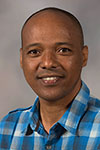Faculty

Michael Griswold, PhD
Professor
PubMed Articles
ResearchGate Profile
Curriculum Vitae
Dr. Michael E. Griswold is a Professor in the Department of Data Science at the University of Mississippi Medical Center. He also has Adjunct Faculty appointments in the departments of Biostatistics at Johns Hopkins School of Public Health and the University of Alabama at Birmingham School of Public Health.
Dr. Griswold has extensive experience in the design, execution, and analysis of both observational and experimental studies and consults regularly for academic institutions, medical-journal editorial committees, government regulatory agencies, and industry research organizations on statistical issues. Dr. Griswold’s methodological research focuses on translational biostatistics and multilevel/longitudinal models for complex data archetypes.
Wang W, Wang W, Mosley TH, Griswold ME. A SAS macro for the joint modeling of longitudinal outcomes and multiple competing risk dropouts. 2017 Jan;138:23-30. doi: 10.1016/j.cmpb.2016.10.003. Epub 2016 Oct 18. PMID: 27886712
Windham BG, Griswold ME, Wang W, Kucharska-Newton, Demerath EW, Gabriel KP, Pompeii LA, Butler K, Wagenknecht L, Krtichvsky S, Mosley TH Jr. The Importance of Mid-to-Late-Life Body Mass Index Trajectories on Late-Life Gait Speed. 2016 Nov 3. pii: glw200. PMID: 27811156

Hao Mei, PhD
Associate Professor
PubMed Articles
Curriculum Vitae
Dr. Hao Mei is a statistical geneticist and genetic epidemiologist with multidisciplinary training in bioinformatics and statistics, and has broad expertise in key research areas of cardiovascular disease risk factors. In his previous work, he developed several statistical methods and software packages for detecting family-based association, high-dimensional gene-gene and gene-environment interaction, genetic pleiotropic effects, and cumulative genetic effects. Dr. Mei's current research is focused on identification of genetic risk factors and biological pathways associated with obesity, diabetes, sleep disorders, and cognitive impairment.
Mei H, Li L, Jiang F, Simino J, Griswold M, Mosley T, Liu S. snpGeneSets: An R package for genome-wide study annotation. G3 (Bethesda). 2016 Dec 7;6(12):4087-4095. doi: 10.1534/g3.116.034694. PMC5144977. PMID: 27807048
Mei H, Li L, Liu S, Jiang F, Griswold M, Mosley T. The uniform-score gene set analysis for identifying common pathways associated with different diabetes traits. BMC Genomics 2015;16(1):336. PMID: 25898945

Jeannette Simino, PhD
Assistant Professor
PubMed Articles
Curriculum Vitae
Dr. Jeannette Simino completed formal training in biochemistry, molecular pathology, statistics, chronic disease epidemiology, and genetic epidemiology. Her postdoctoral research focused on the genetic and environmental architecture of cardiovascular traits, particularly blood pressure and lipid levels. Currently, Dr. Simino is investigating the genetic underpinnings of biomarkers of Alzheimer’s Disease and cognitive aging using data from the Atherosclerosis Risk in Communities (ARIC) Study. She has conducted linkage, genome-wide association, and whole exome sequence analyses, as well as meta-analyses of genetic studies from around the world. Her long-term goal is to identify genes that can be therapeutically targeted to improve a patient’s physical and mental health.
Simino J, Wang Z, Bressler J, Chouraki V, Yang Q, Younkin SG, Seshadri S, Fornage M, Boerwinkle E, Mosley TH. Whole exome sequence-based association analyses of plasma amyloid-β in African and European Americans: the Atherosclerosis Risk in Communities-Neurocognitive Study. PLoS One (in press). PMID: 280704393
Simino J, Shi G, Bis JC, Chasman DI, Ehret GB, Gu X, Guo X, et al. Gene-age interactions in blood pressure regulation: A large-scale investigation using the CHARGE, Global BPgen, and ICBP consortia. Am J Hum Genet. 2014 Jul 3;95(1):24-38. doi: 10.1016/j.ajhg.2014.05.010. Epub 2014 Jun 19. PMID: 24954895

Rajesh Talluri, PhD
Assistant Professor
PubMed Articles
Curriculum Vitae
Webpage
Dr. Rajesh Talluri is a statistician with multidisciplinary training in Electrical Engineering and Biostatistics. He thinks like an engineer but with the statistical methodology as a basis. His PhD thesis was on Bayesian sparse graphical models using shrinkage priors, which was applied to classify different types of cancers based on their genomic profiles. He was awarded a R25 training fellowship by NIDA to develop novel statistical methods for statistical genetics of addiction at the University of Texas MD Anderson Cancer Center, where, he made several contributions to scientific literature in statistical genetics, survival analysis, mediation models, decision curve analysis and risk prediction models.
Rajesh's strength is developing novel statistical methods using interdisciplinary approaches from signal processing, information theory and computer science. He embraces any new problem that comes up, and his research is veering towards machine learning approaches and their applicability to discover novel clinical and genetic factors involved in diseases like obesity, diabetes, dementia and cancer. Rajesh has a strong computational background with experience in parallel computation and big data analyses. He is a strong proponent of reproducible research and uses R and Rstudio for fostering a reproducible workflow for his research. Rajesh is very interested in developing user friendly tools to encourage the use of novel statistical methods by clinicians and basic scientists.
Talluri R, Shete S. Using the weighted area under the net benefit curve for decision curve analysis. BMC Med Inform Decis Mak. 2016 Jul 18;16:94. doi: 10.1186/s12911-016-0336-x. PMID: 4949771
Talluri R, Shete S. Evaluating methods for modeling epistasis networks with application to head and neck cancer. Cancer Inform. 2015 Feb 10;14(Suppl 2):17-23. doi: 10.4137/CIN.S17289. eCollection 2015. PMID: 25733798

Wondwosen Kassahun Yimer, PhD
Assistant Professor
Curriculum Vitae
Dr. Wondwosen Kassahun Yimer is an assistant professor in the Department of Data Science at the University of Mississippi Medical Center. His research interests encompass both statistical methodology and applications. In his previous work, he has published several articles in peer-reviewed scientific journals. Dr Yimer has been involved in key areas of collaborative research including diabetes, nutrition, malaria, childhood diarrhea and family planning. His methodological research focuses on models for hierarchical data, time-to-event data, and joint modeling.
Kassahun W, Neyens T, Molenberghs G, Faes C, Verbeke G. A Zero-Inflated Overdispersed hierarchical Poisson Model. Stat Model. 2014;14:1-18.
Kassahun W, Neyens T, Molenberghs G, Faes C, Verbeke G. Marginalized multilevel hurdle and zero-inflated models for overdispersed and correlated count data with excess zeros. Stat Med. 2014 Nov 10;33(25):4402-19. doi: 10.1002/sim.6237. Epub 2014 Jun 23. PMID: 24957791

YunYun Zhou, PhD
Assistant Professor
PubMed Articles
Curriculum Vitae
Webpage
Dr. Yunyun Zhou has a multi-disciplinary background in computer science, bioinformatics, biostatistics, and epidemiology. She is skilled in collaborative work with both basic scientists and clinical researchers, and also translates biomedical problems into programming language. She is interested in identifying genetic biomarkers for target therapy from next generation sequencing data processing, genomics data integration, molecular regulation mechanism and pathway analysis from a system biology perspective for complex diseases such as cancer, and cardiovascular disease. She is also interested in developing machine learning algorithms for disease predictive models and reproducible tools such as database and software for functional analysis in biomedical research.
Wang J, Yunyun Z, Wang L, Chen X, Zhu Z. ABCG2 confers promotion in gastric cancer through modulating downstream CRKL in vitro combining with biostatistics mining. Oncotarget. 2017 Jan 17;8(3):5256-5267. doi: 10.18632/oncotarget.14128. PMC5354906
Zhang YA, Zhou Y, Luo X, Song K, Ma X, Sathe A, Girard L, Xiao G, Gazdar AF. SHOX2 is a potent independent biomarker to predict survival of WHO grade II-III diffuse gliomas. BioMedicine. 2016 Nov;13:80-89. doi: 10.1016/j.ebiom.2016.10.040. Epub 2016 Oct 28. PMC5264450